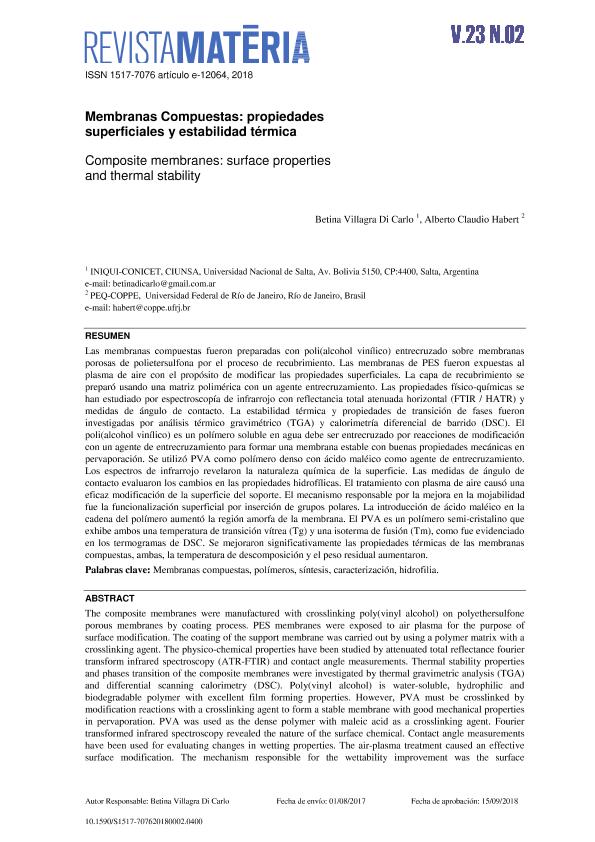Mostrar el registro sencillo del ítem
dc.contributor.author
Villagra Di Carlo, Betina

dc.contributor.author
Habert, Alberto Claudio
dc.date.available
2021-03-11T17:53:31Z
dc.date.issued
2018-07
dc.identifier.citation
Villagra Di Carlo, Betina; Habert, Alberto Claudio; Membranas Compuestas: Propiedades superficiales y estabilidad térmica; Universidade Federal do Rio de Janeiro; Matéria; 23; 2; 7-2018; 1-8
dc.identifier.issn
1517-7076
dc.identifier.uri
http://hdl.handle.net/11336/128108
dc.description.abstract
Las membranas compuestas fueron preparadas con poli(alcohol vinílico) entrecruzado sobre membranas porosas de polietersulfona por el proceso de recubrimiento. Las membranas de PES fueron expuestas al plasma de aire con el propósito de modificar las propiedades superficiales. La capa de recubrimiento se preparó usando una matriz polimérica con un agente entrecruzamiento. Las propiedades físico-químicas se han estudiado por espectroscopía de infrarrojo con reflectancia total atenuada horizontal (FTIR / HATR) y medidas de ángulo de contacto. La estabilidad térmica y propiedades de transición de fases fueron investigadas por análisis térmico gravimétrico (TGA) y calorimetría diferencial de barrido (DSC). El poli(alcohol vinílico) es un polímero soluble en agua debe ser entrecruzado por reacciones de modificación con un agente de entrecruzamiento para formar una membrana estable con buenas propiedades mecánicas en pervaporación. Se utilizó PVA como polímero denso con ácido maléico como agente de entrecruzamiento. Los espectros de infrarrojo revelaron la naturaleza química de la superficie. Las medidas de ángulo de contacto evaluaron los cambios en las propiedades hidrofílicas. El tratamiento con plasma de aire causó una eficaz modificación de la superficie del soporte. El mecanismo responsable por la mejora en la mojabilidad fue la funcionalización superficial por inserción de grupos polares. La introducción de ácido maléico en la cadena del polímero aumentó la región amorfa de la membrana. El PVA es un polímero semi-cristalino que exhibe ambos una temperatura de transición vítrea (Tg) y una isoterma de fusión (Tm), como fue evidenciado en los termogramas de DSC. Se mejoraron significativamente las propiedades térmicas de las membranas compuestas, ambas, la temperatura de descomposición y el peso residual aumentaron.
dc.description.abstract
The composite membranes were manufactured with crosslinking poly(vinyl alcohol) on polyethersulfone porous membranes by coating process. PES membranes were exposed to air plasma for the purpose of surface modification. The coating of the support membrane was carried out by using a polymer matrix with a crosslinking agent. The physico-chemical properties have been studied by attenuated total reflectance fourier transform infrared spectroscopy (ATR-FTIR) and contact angle measurements. Thermal stability properties and phases transition of the composite membranes were investigated by thermal gravimetric analysis (TGA) and differential scanning calorimetry (DSC). Poly(vinyl alcohol) is water-soluble, hydrophilic and biodegradable polymer with excellent film forming properties. However, PVA must be crosslinked by modification reactions with a crosslinking agent to form a stable membrane with good mechanical properties in pervaporation. PVA was used as the dense polymer with maleic acid as a crosslinking agent. Fourier transformed infrared spectroscopy revealed the nature of the surface chemical. Contact angle measurements have been used for evaluating changes in wetting properties. The air-plasma treatment caused an effective surface modification. The mechanism responsible for the wettability improvement was the surface functionalization by insertion of polar groups. Introduction of maleic acid into the polymer chain increased the amorphous region of the membrane. The PVA is a semi-crystalline polymer exhibiting both a glass transition temperature (Tg) and a melting isotherm (Tm), as evidenced in the DSC thermogram. Thermal properties of the composite membranes were significantly enhanced. Both, the decomposition temperature and the residual weight increased when compared with dense PVA membranes. The chemically crosslinked PVA with maleic acid resulted in the formation of composite membranes with improved pervaporation properties for separation application.
dc.format
application/pdf
dc.language.iso
spa
dc.publisher
Universidade Federal do Rio de Janeiro

dc.rights
info:eu-repo/semantics/openAccess
dc.rights.uri
https://creativecommons.org/licenses/by/2.5/ar/
dc.subject
MEMBRANAS
dc.subject
COMPUESTAS
dc.subject
SINTESIS
dc.subject
CARACTERIZACION
dc.subject
HIDROFILIA
dc.subject.classification
Recubrimientos y Películas

dc.subject.classification
Ingeniería de los Materiales

dc.subject.classification
INGENIERÍAS Y TECNOLOGÍAS

dc.title
Membranas Compuestas: Propiedades superficiales y estabilidad térmica
dc.title
Composite membranes: surface properties and thermal stability
dc.type
info:eu-repo/semantics/article
dc.type
info:ar-repo/semantics/artículo
dc.type
info:eu-repo/semantics/publishedVersion
dc.date.updated
2020-12-10T13:31:17Z
dc.journal.volume
23
dc.journal.number
2
dc.journal.pagination
1-8
dc.journal.pais
Brasil

dc.journal.ciudad
Rio de Janeiro
dc.description.fil
Fil: Villagra Di Carlo, Betina. Consejo Nacional de Investigaciones Científicas y Técnicas. Centro Científico Tecnológico Conicet - Salta. Instituto de Investigaciones para la Industria Química. Universidad Nacional de Salta. Facultad de Ingeniería. Instituto de Investigaciones para la Industria Química; Argentina
dc.description.fil
Fil: Habert, Alberto Claudio. Universidade Federal Do Rio de Janeiro. Inst A.luiz Coimbra de Pos-graduacao E Pesquisa de Engenharia; Brasil
dc.journal.title
Matéria

dc.relation.alternativeid
info:eu-repo/semantics/altIdentifier/url/http://www.scielo.br/scielo.php?script=sci_arttext&pid=S1517-70762018000200474&lng=es&tlng=es
dc.relation.alternativeid
info:eu-repo/semantics/altIdentifier/doi/http://dx.doi.org/10.1590/s1517-707620180002.0400
Archivos asociados
